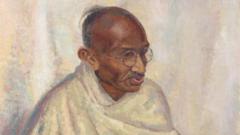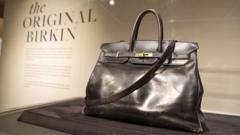India's Ministry of Culture has taken a strong stand against an upcoming auction by Sotheby's in Hong Kong, involving jewels believed to be linked to the remains of Buddha, urging for their return and legal accountability.
India Demands halt to Auction of Buddha-linked Jewels

India Demands halt to Auction of Buddha-linked Jewels
Indian government threatens legal action against Sotheby's over auction of sacred jewels associated with Buddha's remains.
The Indian government is asserting its rights over a collection of jewels associated with the relics of Buddha, ahead of an auction scheduled by Sotheby's in Hong Kong. These artifacts, which are believed to have been interred alongside fragments of Buddha's bones over a century ago, are now at the center of a contentious debate over cultural heritage and ownership.
In a letter posted on social media, India's Ministry of Culture declared the auction “a violation of Indian and international laws” and categorized the jewels, which include a variety of precious gems, as sacred objects that must be respected. The auction, set for this Wednesday, has triggered widespread backlash from Buddhist communities around the world, as well as art scholars concerned about ethical practices in the handling of cultural artifacts.
The jewels are in the possession of Chris Peppé, the great-grandson of William Claxton Peppé, the Englishman who uncovered them during excavations in 1898 at a stupa in Piprahwa, southeastern Nepal—a site regarded as crucial in Buddhism. The Ministry criticized Peppé's claim of ownership, alleging he lacks the authority to facilitate the transaction and accused Sotheby's of perpetuating colonial exploitation by assisting in the sale of the relics.
Historically, the relics unearthed by Peppé were ultimately given to authorities of colonial India, with some of the artifacts later transferred to the Buddhist King of Siam and others stored in the Indian Museum in Kolkata. The remainder remained within the Peppé family, purportedly as "duplicates" of the original discovery, a term the Indian ministry disputes as misleading.
The Ministry’s statement emphasizes the significance of these artifacts as part of India’s "inalienable religious and cultural heritage," and asserts that these items cannot be treated merely as specimens for trade but must be recognized in the context of their sacred value. The ongoing debate has now encroached upon legal implications, with the Indian government precedent in its stance to enforce compliance through threatened legal measures in both India and Hong Kong should Sotheby’s and Peppé fail to adhere to their requests.
In former remarks, Chris Peppé suggested that the family considered donating the relics but found no viable paths, leading them to pursue the auction as a transparent option for transferring ownership to the Buddhist community. The family has also assured that the jewels have been showcased in significant exhibitions, including a recent display at The Met in 2023.
As this cultural controversy unfolds, the Indian government underscores their demand for a public apology and complete disclosure of ownership records concerning the jewels. The situation remains tense as both parties remain in negotiation, while the issue of colonial legacies and rights to sacred heritage rumbles on.
In a letter posted on social media, India's Ministry of Culture declared the auction “a violation of Indian and international laws” and categorized the jewels, which include a variety of precious gems, as sacred objects that must be respected. The auction, set for this Wednesday, has triggered widespread backlash from Buddhist communities around the world, as well as art scholars concerned about ethical practices in the handling of cultural artifacts.
The jewels are in the possession of Chris Peppé, the great-grandson of William Claxton Peppé, the Englishman who uncovered them during excavations in 1898 at a stupa in Piprahwa, southeastern Nepal—a site regarded as crucial in Buddhism. The Ministry criticized Peppé's claim of ownership, alleging he lacks the authority to facilitate the transaction and accused Sotheby's of perpetuating colonial exploitation by assisting in the sale of the relics.
Historically, the relics unearthed by Peppé were ultimately given to authorities of colonial India, with some of the artifacts later transferred to the Buddhist King of Siam and others stored in the Indian Museum in Kolkata. The remainder remained within the Peppé family, purportedly as "duplicates" of the original discovery, a term the Indian ministry disputes as misleading.
The Ministry’s statement emphasizes the significance of these artifacts as part of India’s "inalienable religious and cultural heritage," and asserts that these items cannot be treated merely as specimens for trade but must be recognized in the context of their sacred value. The ongoing debate has now encroached upon legal implications, with the Indian government precedent in its stance to enforce compliance through threatened legal measures in both India and Hong Kong should Sotheby’s and Peppé fail to adhere to their requests.
In former remarks, Chris Peppé suggested that the family considered donating the relics but found no viable paths, leading them to pursue the auction as a transparent option for transferring ownership to the Buddhist community. The family has also assured that the jewels have been showcased in significant exhibitions, including a recent display at The Met in 2023.
As this cultural controversy unfolds, the Indian government underscores their demand for a public apology and complete disclosure of ownership records concerning the jewels. The situation remains tense as both parties remain in negotiation, while the issue of colonial legacies and rights to sacred heritage rumbles on.

















